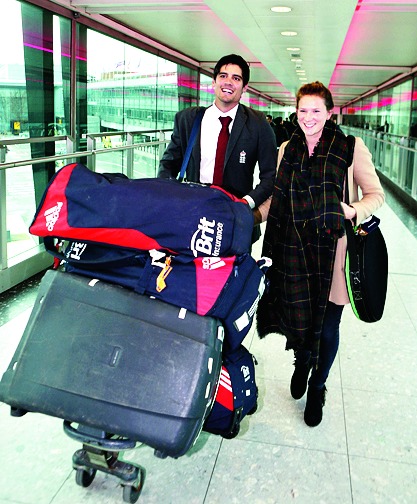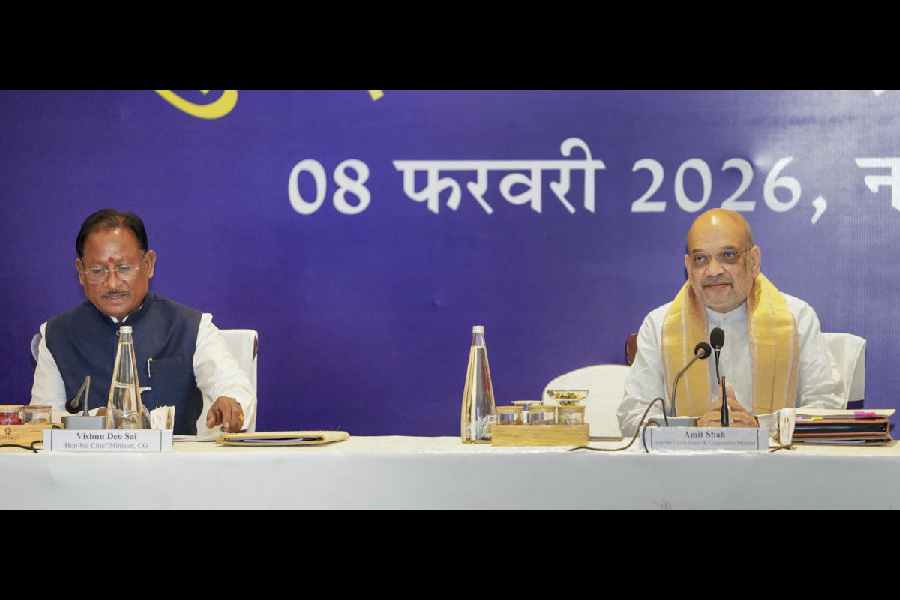
In December 2012, the captain of the English cricket team, Alastair Cook, flew back to Heathrow as an all-conquering hero, having achieved what was considered nearly impossible: defeating India 2-1 at home. He himself scored 122 runs in Mumbai and 190 runs at Eden Gardens.
He was received by thousands of wildly cheering fans, given a police escort, garlanded by politicians, showered with advertising deals and gifted a cash prize of £1 million, a Mercedes Benz and five acres of land. I jest, of course. None of this happened. He collected his own luggage and slipped quietly away with his wife to his sheep farm, as he will after his final farewell at the Oval. As in politics, nearly all cricket careers end in failure. After his poor performances - so far - in the ongoing series against India, some cricket correspondents were calling for Cook to be dropped. Even so, his decision to hang up his pads came as a shock. The Daily Telegraph ran the story big on Page One.
Cook was both made and unmade by India. In 2006, the 21-year-old was summoned from England's A team in Antigua, spent three days travelling and made a century on debut at Nagpur. His highest, 294, was against India at Edgbaston in 2011. He was once so prolific that the English predicted he might overtake Sachin Tendulkar in Test centuries. There is "one superlative which can be accorded to Cook," observed the cricket writer, Scyld Berry. "No England captain has slotted back better into the ranks and rocked the boat less. The proof is how he never stood on ceremony or seniority in the field. England's most senior player was ready to stand at short-leg for Moeen Ali, like the most junior pro, and take the blows - the finest and least egotistic of team-men until he called it an end."

Crucial achievement
Perhaps I am not being entirely serious when I suggest that England's secret weapons against India are its Pakistani-origin players, such as Moeen Ali, who took five wickets for 63 runs in the first innings and four for 71 in the second in the Test match at Southampton. At one stage, it seemed that Moeen's Test career was over, but there is nothing like India to bring out the best in Pakistanis.
A couple of years ago, I went to Birmingham to meet Moeen, who told me that his faith was most important to him. British newspapers, which generally berate the nation's three million-strong Muslim population with stories about everything from the burqa to terrorism, make an exception for "Mo", who is portrayed as a role model for his community.
But Moeen achieved something even more important last week - he got Virat Kohli caught by Alastair Cook for 58, and Ajinkya Rahane out, leg before wicket, for 51 in the second innings. Incidentally, Moeen is a really nice guy when not bowling against India.
History lessons
In 2016, the Indian Journalists' Association held a welcome dinner for Navtej Sarna, the new high commissioner in London, only to bid him farewell seven months later when he was sent to Washington as ambassador. I am relieved that analysing Donald Trump's tweets does not keep him so busy that he cannot find time to do the odd book review for the Financial Times.
Navtej quite likes David Gilmour's The British in India: Three Centuries of Ambition and Experience, but expresses irritation with the frequent "repetitions and errors of fact or interpretation" in Viceroys: The Creation of the British by Christopher Lee. But Navtej, like Shashi Tharoor, makes the point that "Gilmour's narrative, however charming, cannot airbrush the ugly realities of colonial rule: the duplicity, greed and smug self-justification that fuelled British political and racial domination of India or indeed the economic looting of a once wealthy civilisation." I once learnt a lot about the viceroys from an exhibition on India at Eton College, which had produced many of them, including Lord Curzon. The history teacher, Andrew Robinson, organized the exhibition by getting the boys to bring family heirlooms. He demonstrated how unkind the Brits had been to Indians by screening Lagaan.
Precious letters
Tanika Gupta, born in the United Kingdom and educated at Oxford, was named the winner of the prestigious £10,000 James Tait Black Prize for Drama for her play, Lions and Tigers, based on letters written from prison by her great-uncle, Dinesh Gupta. He was hanged in Alipore Central Jail on July 7, 1931, for the assassination of Colonel NS Simpson, the inspector-general of prisons, inside Writers' Buildings. His co-conspirators, after whom BBD Bagh is named, were Benoy Basu and Badal Gupta. Tanika lost her mother earlier this year. Gairika and Tapan Gupta set up the Tagoreans, a society aimed at spreading the best of Bengali culture, in 1965, four years after the couple arrived in London from Calcutta.
New identity
Is David Beckham becoming "Indian"? Indians in the UK still refer to elders in the community as 'Uncle', unlike the English who tend to use first names. Yet, when Beckham shared a photograph on Instagram of himself on holiday with Sir Elton John, he captioned the image: "Uncle Elton.... We have known each other now for 25 years... Fun times with each other."
FOOTNOTE

The current hit on BBC TV is the crime drama, Bodyguard, in which the home secretary develops a relationship with her protection officer. The casting is an admirable reflection of modern, multicultural Britain, with two Asian actors: Ash Tandon as Detective Chief Inspector Deepak Sharma from Counter Terrorism Command, and Shubham Saraf as Tahir Mahmood, PR adviser to the minister. Britain's last female home secretary was one Theresa May.










